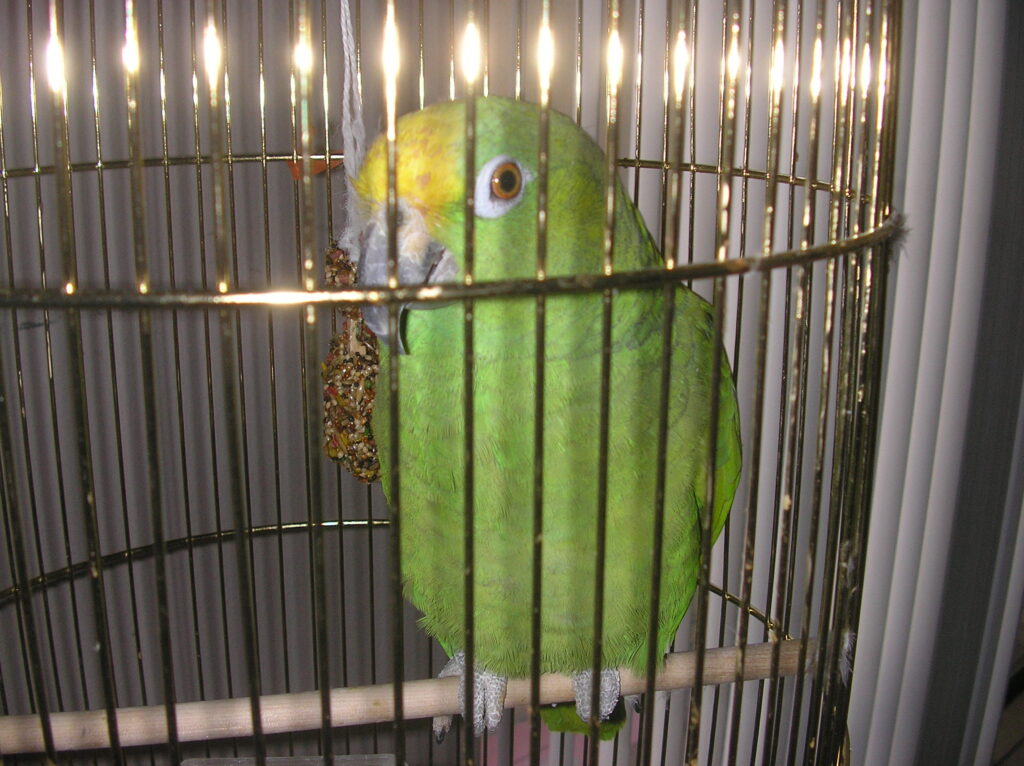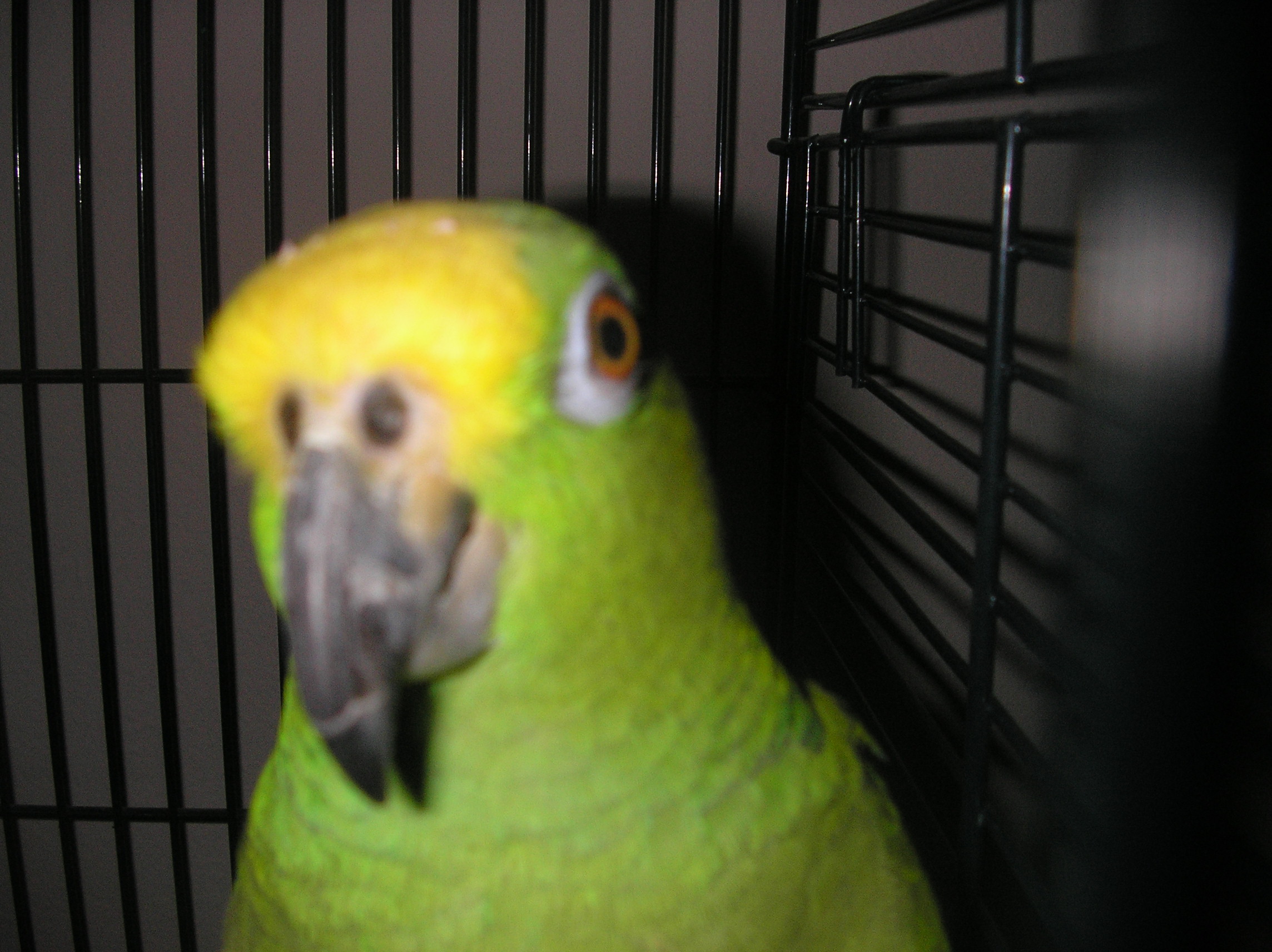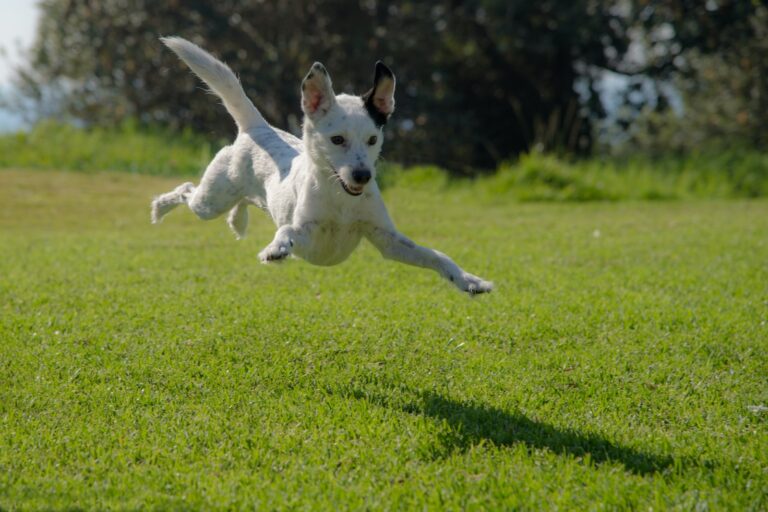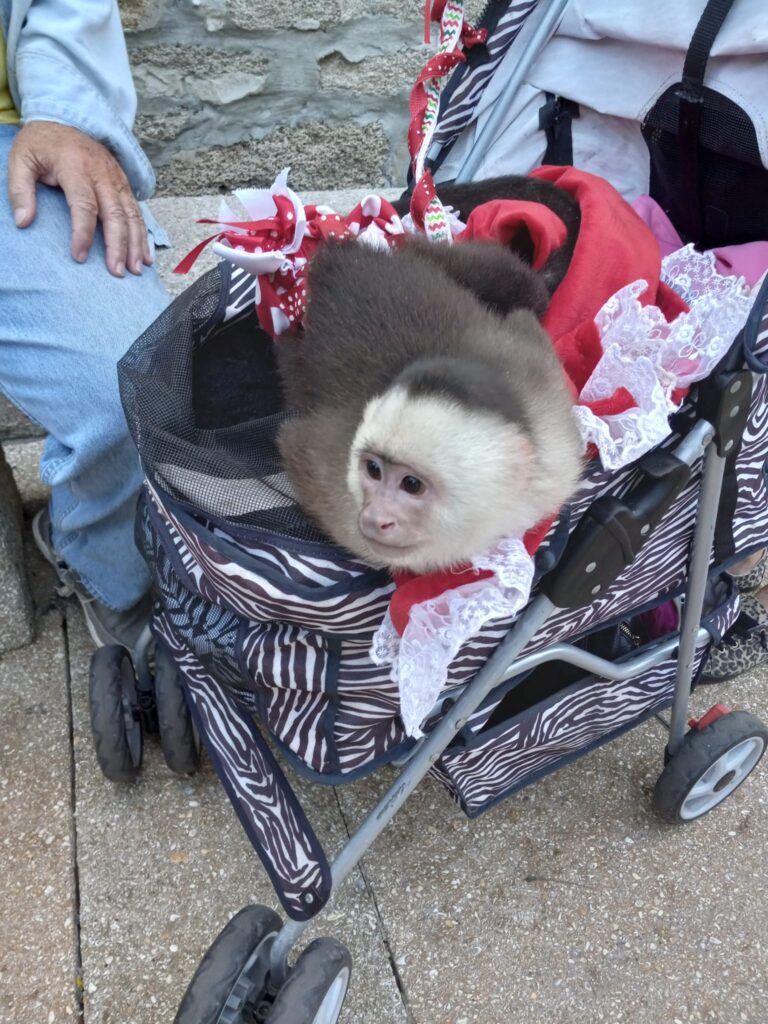Great little Polly
Meet our Polly. She is Amazonian parrot. Polly, like all parrots, has specific dietary needs to ensure she remain healthy and happy. A well-balanced diet is essential for their overall well-being. The primary components of an Amazonian parrot’s diet include:
Pellets: The dietary needs of Amazonian parrots, known for their vibrant plumage and lively personalities, are essential for their overall health. Among the crucial components of their diet, high-quality commercial pellets specifically formulated for Amazonian parrots play a central role in meeting their nutritional requirements. These pellets provide vital vitamins, minerals, and nutrients that are essential for their well-being. Incorporating pellets into their diet offers several advantages, including consistency in nutritional content and prevention of selective feeding behaviors. However, while pellets are valuable, it’s important to complement them with fresh fruits and vegetables to provide variety and enrichment. Monitoring their weight, behavior, and overall health is crucial for adjusting their diet as needed. Regular check-ups with an avian veterinarian can help assess their nutritional status and ensure that their dietary needs are met. Factors like age, activity level, and health conditions should be considered when tailoring their diet. By carefully balancing pellets and fresh foods, you can provide your Amazonian parrot with a wholesome and nourishing meal plan that promotes health, vitality, and a vibrant plumage.
Fresh fruits are an essential component of an Amazonian parrot’s diet, contributing to their overall health and well-being. These vibrant and intelligent birds thrive when provided with a diverse array of fruits that offer a wide range of vitamins, minerals, and antioxidants. Including fruits like apples, bananas, grapes, oranges, berries, and melons in their diet introduces not only a burst of flavor but also a wealth of nutritional benefits. Apples, for instance, provide dietary fiber and vitamins such as vitamin C, while bananas offer potassium and energy. The natural sugars found in fruits offer a valuable source of energy for these active birds. However, it’s crucial to wash the fruits thoroughly before offering them to your parrot to eliminate any potential pesticide residues. Moreover, removing any seeds or pits from fruits like grapes is essential to prevent choking hazards. By incorporating a variety of fresh fruits into their diet, you’re providing Amazonian parrots with a colorful and nutritious feast that supports their vitality and enhances their overall health.
Incorporating dietary diversity for Amazonian parrots involves offering occasional additions like cooked grains and legumes. Cooked grains such as rice and quinoa provide a different nutritional texture, with brown rice supplying complex carbohydrates and B-vitamins, while quinoa offers protein-rich nourishment. These grains are easily digestible and introduce variety to their diet. Lentils and chickpeas, as legume options, contribute further nutritional benefits. Lentils bring plant-based proteins and fiber for digestion, while chickpeas provide minerals like iron and folate. Introducing these components gradually and in controlled amounts ensures a range of flavors and textures. Cooking methods should avoid seasonings or additives. By thoughtfully incorporating these cooked grains and legumes into their regular diet, you provide a well-rounded, nutritionally diverse eating experience that promotes your parrot’s well-being and contentment..
Fresh Vegetables: Fresh vegetables play a vital role in ensuring the well-rounded and balanced diet of Amazonian parrots. These intelligent and lively birds greatly benefit from the nutritional value that various vegetables bring to their diet. A diverse range of vegetables, including carrots, broccoli, bell peppers, spinach, sweet potatoes, and peas, offers a spectrum of essential nutrients that contribute to their overall health and vitality. Carrots, for instance, provide beta-carotene, which supports their immune system and eye health. Broccoli is rich in vitamins and minerals such as vitamin K and calcium, contributing to their bone health and overall wellness. Bell peppers offer a punch of vitamin C and antioxidants, enhancing their immune system and promoting cell health. Spinach provides iron and fiber, crucial for digestion and overall bodily functions. Sweet potatoes offer a source of complex carbohydrates and vitamin A, essential for energy and vision. Peas provide protein and additional fiber, aiding in muscle maintenance and digestion. The inclusion of fresh vegetables in their diet ensures that Amazonian parrots receive the necessary nutrients, vitamins, and minerals that support their growth and well-being. By offering this colorful and nutrient-rich assortment of vegetables, you’re not only enhancing their diet but also enriching their lives with a variety of flavors and textures that stimulate their senses and contribute to their overall happiness.
Nuts and seeds, when offered in moderation, can be a delightful addition to the diet of Amazonian parrots. These small yet nutrient-dense treats provide not only a tasty indulgence but also a source of essential fatty acids, proteins, and other valuable nutrients. Almonds, with their heart-healthy fats and vitamin E, offer a satisfying crunch that parrots enjoy. Walnuts provide omega-3 fatty acids, promoting brain health and supporting their vibrant feathers. Pistachios offer a range of vitamins and minerals, including B-vitamins and potassium, enhancing their overall vitality. Sunflower seeds are beloved for their rich flavors and are a source of vitamin E and selenium, contributing to their immune system and feather health. Pumpkin seeds provide an excellent dose of magnesium and zinc, essential for various bodily functions. However, it’s important to note that while nuts and seeds offer nutritional benefits, they should be given in moderation due to their higher fat content. Incorporating these treats as occasional rewards rather than a primary dietary component ensures that your Amazonian parrot enjoys their flavors while maintaining a well-balanced and nutritionally sound diet. The key is to strike a balance, using nuts and seeds as a flavorful incentive during training sessions or as a special bonding experience. By doing so, you not only provide a tasty variety to their diet but also foster a positive relationship between you and your feathered friend, enhancing their overall quality of life.
Sprouted Seeds: Adding sprouted seeds to an Amazonian parrot’s diet can be a nutritious and enjoyable option. Sprouted seeds are seeds that have undergone the germination process, which enhances their nutritional content and digestibility. Sprouting breaks down the seed’s protective layers, increasing the availability of vitamins, minerals, and enzymes. This process also reduces the presence of anti-nutrients, making the nutrients more bioavailable for absorption. Offering sprouted seeds can contribute to your parrot’s overall health and well-being. To prepare sprouted seeds, rinse them thoroughly and allow them to germinate in a clean, moist environment. As the seeds sprout, they become softer and more palatable, making them easier for your parrot to consume. Remember to offer sprouted seeds in moderation as part of a balanced diet. By introducing sprouted seeds, you provide your Amazonian parrot with a nutrient-rich and flavorful addition that supports their vitality and enjoyment of mealtime.
Ensuring an adequate calcium source for your Amazonian parrot is essential for their overall health and well-being. Calcium is a crucial mineral that plays a vital role in maintaining strong bones, beaks, and overall bodily functions. Parrots, including Amazonians, have unique calcium requirements, and providing them with appropriate sources is essential.
Cuttlebone and mineral blocks are two common options that can fulfill your parrot’s calcium needs. Cuttlebone is a lightweight, natural source of calcium derived from the internal shell of cuttlefish. It provides not only calcium but also other essential minerals such as magnesium and potassium. Cuttlebone serves as both a dietary supplement and a beak-maintenance tool, as parrots often enjoy chewing on it.
Mineral blocks are designed to offer a blend of minerals, including calcium, in a convenient and easily accessible form. These blocks often come in various shapes, sizes, and flavors to cater to your parrot’s preferences. They can be hung in the cage, allowing your parrot to nibble on them as needed.
Introducing these calcium sources to your Amazonian parrot’s diet should be done with care and consideration. While calcium is vital, it’s important not to over-supplement, as an excessive intake of calcium can lead to imbalances and health issues. Monitoring your parrot’s calcium intake and consulting with an avian veterinarian can help ensure you’re providing the right amount.
In addition to cuttlebone and mineral blocks, incorporating calcium-rich foods into their diet is beneficial. Foods like dark leafy greens (e.g., kale, collard greens), broccoli, and fortified pellets can contribute to their calcium intake. However, it’s crucial to remember that dietary calcium sources alone may not always be sufficient to meet your parrot’s needs, which is where cuttlebone and mineral blocks play a valuable role.
To maintain optimal health, it’s essential to strike a balance between providing calcium sources and offering a well-rounded, diverse diet that meets all of your Amazonian parrot’s nutritional requirements. By incorporating calcium sources like cuttlebone or mineral blocks into their diet and consulting with avian experts, you’re taking proactive steps to ensure your feathered friend’s bone and beak health while promoting their overall vitality.
We usually choose Kaytee. The brand seems to have good variety of options and Polly enjoys pretty much every variety they offer. Our usual go to is featured right here in this blog.

Remember that each parrot is an individual, and their preferences may vary. It’s essential to observe your parrot’s behavior and consult with an avian veterinarian to ensure their dietary needs are being met. Additionally, providing enrichment through foraging toys and offering food in different forms can help keep them mentally stimulated and engaged with their diet
And always consult with professionals before selecting appropriate diet for your birdie.







